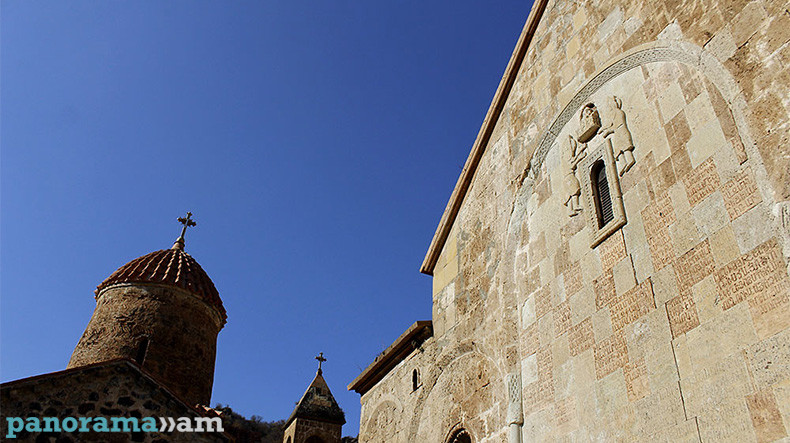
Azerbaijan pursuing a clear policy aimed at erasing Armenian cultural and historical traces from Artsakh – Monument Watch
The Artsakh Monument Watch sounded the alarm on the destruction of the Armenian cultural heritage in the Azerbaijani-occupied territories of Artsakh after Azerbaijan announced plans to erase Armenian inscriptions from churches. The full text of a statement released by the Monument Watch on 5 February is provided below.
"On February 3, 2022, the Azerbaijani Report news agency published an article, which presented a statement made by the Minister of Culture of Azerbaijan Anar Karimov. Quoting the words of the minister, the portal notes that Azerbaijan is going to create a special working group consisting of experts on history, culture, and architecture of Caucasian Albania, as well as representatives of state structures, who, after studying the matter will have to "remove the fictitious traces, letters, and inscriptions written by Armenians” from the walls of the “Albanian religious/Christian” buildings in Artsakh.
Anar Kerimov added that the special working group has “already inspected those places”, and after clearing the areas of mines, already in a safe environment, with the help of the involved international experts they will discover “the Armenian forgery and changes and present them to the international community”.
Does this mean that thousands of Armenian inscriptions on the monuments of Artsakh should be erased, as Aliyev already showed in Tsakuri? Inscriptions are the most important and primary evidence of belonging to this heritage.
Our response
It is clear from the Azerbaijani minister's statement that Azerbaijan is planning to destroy traces of the Armenian heritage in Artsakh under the guise of “so-called” restoration of the "Albanian" culture. You can read about this matter in another article on our portal "Udi propaganda as an expression of Azerbaijani politics".
Such a statement made by a high-ranking official of Azerbaijan proves that Azerbaijan is pursuing a clear programmatic policy aimed at eradicating the Armenian cultural and historical traces on the territory of Artsakh, this time openly threatening to erase and destroy the inscriptions from the Armenian churches in Artsakh.
Azerbaijan, seeing that the world community does not adequately respond to its obvious vandalism of Armenian historical churches after the 44-day war, has chosen a different path - to preserve the Armenian churches, eliminating the Armenian trace, illegally appropriating the entire heritage of the Christian community.
In this regard, it should be noted that there are no Albanian churches on the territory of Artsakh, with “inserted” Armenian inscriptions. The "scientific community" of Azerbaijan does not have sufficient professional knowledge of understanding the Armenian Christian culture and monuments, as evidenced by their own publications, which were limited to the presentation of Muslim architecture. The only thing that Azerbaijanis can do "fine" is to distort, destroy and falsify.
Moreover, if this alleged commission tries to implement its program of the cultural genocide of Armenians, it will deprive the cultural heritage of Artsakh Armenians of its phenomenon of authenticity, distort the historical truth, deprive generations of the opportunity to enjoy and live by the culture created by their community. Such a policy expresses discrimination and violates the freedom of thought, conscience and religion contained in the Universal Declaration of Human Rights, and the right created by this freedom to determine the significance of cultural heritage by the community itself.
This is also a gross violation of cultural law. The Nara Document on the Protection of the Principles of Authenticity states that in cases where cultural values appear to be in conflict, respect for cultural diversity demands acknowledgment of the legitimacy of the cultural values of all parties.
It is important to emphasize the basic principles of UNESCO's activities, according to which the responsibility for the preservation and management of cultural heritage lies on the community that created this cultural heritage. And the importance of the fact of the authenticity of cultural heritage should in no case be underestimated (Nara Document on Authenticity, paragraph 8)."
.jpg)
.jpg)
Related news
- Mother See slams Azerbaijan’s plans to erase Armenian traces from churches
- Azerbaijani soldiers vandalize Armenian church in Artsakh village
- Policy of destroying Armenian historical, cultural heritage runs counter to Baku's statements on reconciliation – Foreign Ministry
- USCIRF concerned by Azerbaijan’s plans to erase Armenian traces from churches
Newsfeed
Videos






























